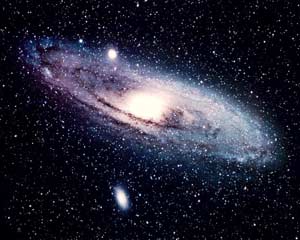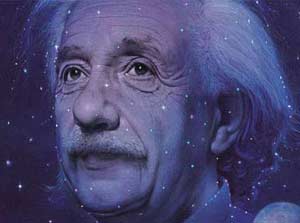The romance of physics
 Physics is probably the most romantic natural science in basic science subjects. The romance of physics is the sparkle of the planets, the shimmer of planets on the Milky Way, the glitter of the fundamental particles that constitute the universe, the relative and absolute of time - space, and even the silent silence of supernatural .
Physics is probably the most romantic natural science in basic science subjects. The romance of physics is the sparkle of the planets, the shimmer of planets on the Milky Way, the glitter of the fundamental particles that constitute the universe, the relative and absolute of time - space, and even the silent silence of supernatural .
As the yin and yang spiral in the eastern polar map, physics studies from the most micro-problems to the most macroscopic problems of nature that human life is constantly searching for answers. Life is full of mysteries, even simple simple ideas contain a wealth of mysteries that we have not yet discovered. So in the journey full of hardships, with his heavy vocation, physics has resolved the mysteries of nature and society. And it continues to decode those mysteries .
The physical view is accurate , even accurate to micrometers, nanometers, and more, but the eyes of physics are poignant and romantic eyes as it directs that gaze to the full sky Why, in the immense and deep space of the solar system, to penetrate the nature and endless movements of living beings, objects . And romantic eyes that overshadow the past, prognosis of the future to then returned to the innocent but empathetic and profound eyes that were innocent and innocent in childhood.
Are the physical eyes always thoughtful and optimistic? Suddenly, I suddenly noticed that his eyes were very familiar. It seems to be a thoughtful meditation in the century-old statue of a Renaissance sculptor.

Great scientist - Albert Einstein
(Photo: Time)
The stone statue carved a man in a sitting posture, his bare arm rested on a high forehead, his eyes wandering in thought. The man still sitting there from the light of the century, still pondering the thoughts. Around the white statue, the birch row still rustled the leaves and the white snow still fell sweetly on his feet. And around his head were the question marks why the electron atoms moved in the orbit of the laurel when he uttered 'Oreka' . Or seemed to be the concerned look when thousands of times saw the falling apple. Isaac Newton, his glint in the Twentieth Century. TI. Einstein made a little dream in his dream with a desire for light on the unified symphony of unified field theory. Or the light-eyed smile that Copernic's superiority, Bruno's firm gaze before stepping on the pyre .
Passion for science and even courage has propelled the romance of physics to its Olympia. In that place, it will not be the abode of the gods as in Greek and Roman mythology but the place of human intellect, of human beliefs and achievements of scientific research. In that place will be full of light, beautiful and heavenly. Romantic physics is more than math, chemistry, and romance, perhaps because it studies optics and light interaction (though the bright light of the sun, cold light provides Quang Ha or light shines from the end of the tunnel) to see light as a particle as a wave and a miraculous transformation between those two states .
The virtue of art is a passion towards the feet - good - america and human values. The virtue of philosophy is skeptical. And religion is heavy on faith. And the quality of science is surprised by the most obvious things. Surprisingly looking at the fallen apple on the ground where physics has a law of universal gravitation, surprisingly soaking in a bath where physics has Achimet's law. Surprised, surprised and surprised . Great and romantic surprises.
If poetry goes for beauty, philosophy seeks wisdom and religion to find gods, science seeks wisdom. Physics on the way to search for understanding has incited an incomparable desire to be the Final Theory (The Final Theory).

The Final Theory - The Final Theory
(Photo: codap)
as an extreme expression of romance.
Can we be aware of the ultimate secret of the universe? The real world, both concrete and very abstract, both chaotic and orderly, contradictory and unified. Matter and field, energy and mass, space and time, waves and particles, particles and antiparticles . These properties transform each other in translation.
Can we know what cannot be known? Physics, as well as the objective world carry in themselves the contradictory properties, describing the generalization of reality by the theorem, the law, the theory is very accurate and clear but also because of that. have a romantic look .
The dream of the Lunar Moon is not so far away from humans anymore , the journey through the air - the time in Tu Thuc met theoretically is not a myth either. The most romantic physics in the natural sciences is not because it is close to poetry by explaining the cryptic mysteries of ancient myths or fiction, but because it is philosophical. As an old Zen master sits on a koan beside an ancient tree to realize himself and the community in the synthesis of mutual relationships on all fields: nature, society and thinking.
Physics is not only parallel to the ups and downs of human civilization, it is also the history of life. Without boundary science, art has its roots as someone once said, physics on its development path has come to life. As a specialized science, at one point, physics touches on the core issues of philosophy as ontology and epistemology.
It was no coincidence that Fritjof Capra saw the direction of physics and writing into books if physics was just something dry without his romance. It was the deep romance of physics that gave him a primitive view of the world and society, about the original life and the profound meaning of life . His book Dao of physics (translated by Nguyen Tuong Bach, Young Publishing House, 1999) is a voice about the encounter between modern physics and ancient Eastern philosophy.
"Modern physics miraculously confirms one of the basic ideas of Eastern religion: all the concepts that we use to describe nature are limited; these are not characteristics. of reality as we were inclined to believe, but only the creations of the mind, just the map, not the mountains, the land, every time we expand the field of experience, the the limit of pure thought becomes obvious and we must change, sometimes give up, some concepts we have. "
 The physics itself from the deep has brought with it the romance, and the most romantic and most mystical thing is the origin of all things physics and all the ancient and modern science has , is and will remain forever. The discussion between the speakers was the scientists of astronomy Professor Nguyen Quang Rieu, Professor of Physics Pham Xuan Yem, the physicist and Buddhist scholar Nguyen Tuong Bach at the Khuong Viet Street (Paris, France) on May 29, 2005, talked about the similarity between modern physics worldview and Buddhist philosophy also proved it.
The physics itself from the deep has brought with it the romance, and the most romantic and most mystical thing is the origin of all things physics and all the ancient and modern science has , is and will remain forever. The discussion between the speakers was the scientists of astronomy Professor Nguyen Quang Rieu, Professor of Physics Pham Xuan Yem, the physicist and Buddhist scholar Nguyen Tuong Bach at the Khuong Viet Street (Paris, France) on May 29, 2005, talked about the similarity between modern physics worldview and Buddhist philosophy also proved it.
Bohm introduced the yin and yang theory, Erwin Shrodinger wrote the Vedic of a physicist, Nguyen Tuong Bach presented in the book The sky of a man who woven? (Young Publisher, 2004) step by step the science of Aristote to explain the universe and the theory of Buddhism in the past 25 centuries but now is almost an interesting comparison between development. of the awareness of the universe in physical science and the Buddhist cosmos to see astrophysicists knocking on the door of the Eastern philosophical building, lighting up the new questions they ask in head.
Indeed I have no intention of talking about the encounter of Western civilization and Eastern ancient culture, but the romance of physics has led me to deliver that myth. Is there a famous physicist who does not have a philosophical question in mind about matter, about the universe and how many people who discovered Quantum mechanics are at the same time philosophers?
Max Planck never concealed himself with a deep religious soul, did Einstein hesitate to utter Buddhist admiration? Separating from religion and theology to grow up, physical science always seems to be similar to philosophy and sacredness. Science is just science and religion are religious, but those two natural streams have the same branch as the hidden beauty of life, the romance of the soul. So, the romance of physics or human romance? .
- Colorful story of 'love' of animals
- The 36th National Conference on Theoretical Physics
- The world's greatest
- Three Japanese won the Nobel Prize in physics
- Vietnam won two gold medals of the International Physics Olympiad
- Three Vietnamese scientists have works in the first-class international physics magazine
- Inventing CCD won the 2009 Nobel Prize in Physics
- 5 physics revolutionary fantasy experiments by Einstein
- A theory being tested can cause textbooks to be rewritten
- From the tape to the Nobel Prize for Physics 2010
- The invention of laser won the Nobel Prize in Physics 2018
- Japanese scientist won the 2014 Nobel Prize in Physics
 The most famous scientific failures in history
The most famous scientific failures in history Mysterious genius mechanic and the machine froze time
Mysterious genius mechanic and the machine froze time The son carries the 'bad gene' of genius Albert Einstein
The son carries the 'bad gene' of genius Albert Einstein Isaac Newton
Isaac Newton